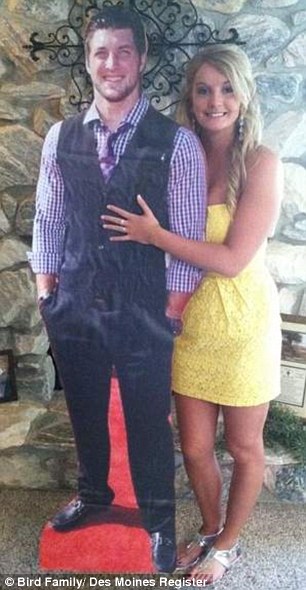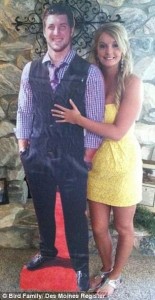
by Jason Joyner | Aug 29, 2012 | 3-D, Blog, characters, conference, revision can be fun, writing craft
It is time to revisit some old friends of mine.
You’d think after working on a novel for 7 years that I’d know these people pretty well by now. However, sometimes you don’t really ask the questions that get you deep into a relationship.
When I’ve had critiques done of my work so far, my main character Jenna usually comes across as well-rounded. She was a little too head-strong initially, but I think I’ve worked some of her rough edges down.
 |
| I think Tebow is more than just a cutout |
Now the male lead and her romantic interest, Derek? He’s another story. I think I start off showing the differences he has compared to Jenna, but he later on blends into being whatever she needs him to be. I think I lost track of who he was. In doing so, I don’t think he is very three-dimensional.
I know I love it when a book has numerous 3-D characters, people who reflect reality and could be someone you know in real life. The cardboard cutouts in a book get boring fast.
This is the right time to recognize this. I’ve got the whole book in front of me to show who Derek is in more depth. Why does he accompany Jenna to Thailand? What does he want?
I’m not settling for two 3-D characters either. I want to evaluate my secondary characters and see what I can do for them. One or two of them are fairly well-rounded. I’ll have to evaluate that when I get to them.
I am finding that the first draft is hard to get down. The framework of the story needs a foundation, and that can be tricky for me at times. The revision seems to be going smoothly for me. Now that I see the outline, I can work on filling the
meat out onto the bones. And mix my metaphors.
What do you do when it comes to creating depth in your characters? How do you beef them up in the revision process?
—
by Jason Joyner | Feb 8, 2012 | Blog, characters, links, Novel Rocket, writing craft, Writing Wednesday
Sometimes you just need to know when to shut up and let others talk.
There was an excellent article today on Novel Rocket about characterization by Cindy Woodsmall. She has four “B”s to use: Before. Behind. Between. Begin.
This is a succinct yet very insightful way to understand your characters. Here is a quote:
Begin your novel armed with the full knowledge of who your characters are – the before, the behind, and the between. Then ask yourself, what would this person do – how would he or she react – when caught in the emotional or physical destruction in which your plotting places them? Once you’ve completed these steps, you won’t have to know the answer to how they would react when placed in different circumstances. The character – who that person is – will dictate what he or she will do in any given situation. Each character will be true to himself or herself, because you know who they are and from where they have come.
I’ve got nothing to add. Just go read the article. If you’re a writer, you’ll be glad you did!
—
by Jason Joyner | Feb 8, 2012 | Blog, characters, links, Novel Rocket, writing craft, Writing Wednesday
Sometimes you just need to know when to shut up and let others talk.
There was an excellent article today on Novel Rocket about characterization by Cindy Woodsmall. She has four “B”s to use: Before. Behind. Between. Begin.
This is a succinct yet very insightful way to understand your characters. Here is a quote:
Begin your novel armed with the full knowledge of who your characters are – the before, the behind, and the between. Then ask yourself, what would this person do – how would he or she react – when caught in the emotional or physical destruction in which your plotting places them? Once you’ve completed these steps, you won’t have to know the answer to how they would react when placed in different circumstances. The character – who that person is – will dictate what he or she will do in any given situation. Each character will be true to himself or herself, because you know who they are and from where they have come.
I’ve got nothing to add. Just go read the article. If you’re a writer, you’ll be glad you did!
—
by Jason Joyner | Apr 22, 2010 | Blog, characters, CSFF, fiction, writing craft
Heya!
If you missed it or didn’t find it interesting, I encourage you to check out last week’s posts on the book Lost Mission. At least for those of us on the blog tour, there was a lot of deep discussion over themes brought up from the book.
A couple of posts got me thinking about our characters when writing fiction. One reviewer didn’t like the book because they thought some characters were promoting paganism. Now, this is more of a thematic issue they had with the book, but I commented on their post that the book wasn’t promoting paganism, but that the characters were acting according to who they were. The blogger didn’t agree with my assessment, and we agreed to disagree.
Another blogger wanted a character to turn to her Bible to get guidance and figure out what should be done. Certainly it would be ideal if everyone did that, and it would have made sense since the character was devout. I know I dive deeper into my Bible when in trouble, but it may not have served the story and the climiax that was building.
After these two comments came up, it got me thinking that perhaps in Christian fiction we subconsciously want the characters we read about to be “sanitized”. I’m not saying these two commenters wanted this specifically, but my impression was maybe we do want this a little more than we realize.
Of course the type of book is going to drive what type of characters populate it. Lost Mission focused on five characters, four of whom would be considered devout, so I wouldn’t expect rough behavior or language. Still, I think authors can struggle with making a character authentic due to a fear of offending a CBA reader.
There’s also been some blog discussion about the homogenized Christianity seen in a lot of Christian fiction. The believers tend to be from a Protestant, non-denominational “Bible” type church, without distinctive doctrines such as speaking in tongues, high liturgical services, or other significant identifiers (that don’t break the core orthodoxy of the Trinity, the Bible, salvation, etc.). Catholics or people who may be a little less mainstream don’t make it as the examples of a Christian character.
I think this goes back to market forces. The CBA market (it used to stand for Christian Booksellers Association, but now is a term for the specific niche fiction one typically finds in an Evangelical bookstore) is particular and doesn’t like certain feathers ruffled. We can have serial killers in CBA fiction, as long as they don’t cuss and sleep around. We also don’t want the Pew Wars extend into our fiction.
Now the clean-mouthed assassin is a blatant example, but I wonder if we expect too much from our CBA characters. Authors know they have a certain audience to please, and perhaps the edges are knocked off a bit. As I flail away at my work in progress, I did a character bio sheet to help me know my heroine better. One questioned asked about sexual experience. My first instinct is to say, “No, she has been chaste.” Unfortunately, in our modern world it would be unrealistic to have an attractive, secular college student be a virgin, so I have to concede that she has had premarital sex. It likely won’t come up in the story, so I get a dodge there, but I think my initial reaction is telling.
What say you?
—
by Jason Joyner | Apr 22, 2010 | Blog, characters, CSFF, fiction, writing craft
Heya!
If you missed it or didn’t find it interesting, I encourage you to check out last week’s posts on the book Lost Mission. At least for those of us on the blog tour, there was a lot of deep discussion over themes brought up from the book.
A couple of posts got me thinking about our characters when writing fiction. One reviewer didn’t like the book because they thought some characters were promoting paganism. Now, this is more of a thematic issue they had with the book, but I commented on their post that the book wasn’t promoting paganism, but that the characters were acting according to who they were. The blogger didn’t agree with my assessment, and we agreed to disagree.
Another blogger wanted a character to turn to her Bible to get guidance and figure out what should be done. Certainly it would be ideal if everyone did that, and it would have made sense since the character was devout. I know I dive deeper into my Bible when in trouble, but it may not have served the story and the climiax that was building.
After these two comments came up, it got me thinking that perhaps in Christian fiction we subconsciously want the characters we read about to be “sanitized”. I’m not saying these two commenters wanted this specifically, but my impression was maybe we do want this a little more than we realize.
Of course the type of book is going to drive what type of characters populate it. Lost Mission focused on five characters, four of whom would be considered devout, so I wouldn’t expect rough behavior or language. Still, I think authors can struggle with making a character authentic due to a fear of offending a CBA reader.
There’s also been some blog discussion about the homogenized Christianity seen in a lot of Christian fiction. The believers tend to be from a Protestant, non-denominational “Bible” type church, without distinctive doctrines such as speaking in tongues, high liturgical services, or other significant identifiers (that don’t break the core orthodoxy of the Trinity, the Bible, salvation, etc.). Catholics or people who may be a little less mainstream don’t make it as the examples of a Christian character.
I think this goes back to market forces. The CBA market (it used to stand for Christian Booksellers Association, but now is a term for the specific niche fiction one typically finds in an Evangelical bookstore) is particular and doesn’t like certain feathers ruffled. We can have serial killers in CBA fiction, as long as they don’t cuss and sleep around. We also don’t want the Pew Wars extend into our fiction.
Now the clean-mouthed assassin is a blatant example, but I wonder if we expect too much from our CBA characters. Authors know they have a certain audience to please, and perhaps the edges are knocked off a bit. As I flail away at my work in progress, I did a character bio sheet to help me know my heroine better. One questioned asked about sexual experience. My first instinct is to say, “No, she has been chaste.” Unfortunately, in our modern world it would be unrealistic to have an attractive, secular college student be a virgin, so I have to concede that she has had premarital sex. It likely won’t come up in the story, so I get a dodge there, but I think my initial reaction is telling.
What say you?
—

